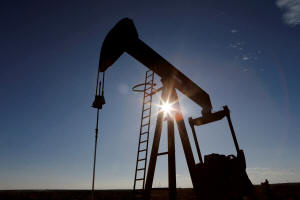Chevron, Exxon shrink spending as coronavirus cuts demand
 Send a link to a friend
Send a link to a friend
 [October 31, 2020] By
Jennifer Hiller, Arathy S Nair and Shariq Khan [October 31, 2020] By
Jennifer Hiller, Arathy S Nair and Shariq Khan
(Reuters) - U.S. oil majors Chevron Corp <CVX.N>
and Exxon Mobil Corp <XOM.N> cut spending aggressively in the third
quarter in a race to offset weak trends in fuel demand caused by the
COVID-19 pandemic, though the former managed a slim profit.
Exxon posted its third straight quarter of losses on Friday and reduced
spending plans for the coming year.
In common with others in the sector, the two are laying off a
substantial portion of their workforce and expect to cut costs further
as they try to reverse years of weak stock performance, worsened by the
impact of movement restrictions.
U.S. oil prices <CLc1> have dropped 41% this year as the coronavirus
forced billions of people into lockdowns. Demand recovered in the late
northern hemisphere summer, but nations including Germany, India and the
United States are again tackling a surge in infections, dampening demand
for gasoline, diesel and jet fuel.

The outlook for energy consumption "depends on when the world - this
country and other countries - get control of the pandemic and those
activities resume. We don't know when that's going to be," said Chevron
Chief Financial Officer Pierre Breber.
Exxon shares were down 1.2% to $32.56 on Friday afternoon. Chevron
shares gained 1.8% to $70.50. Exxon shares have lost half of their value
this year; Chevron's are down 40%.
Chevron, the second-largest U.S. oil producer by production, earned $201
million in the most recent quarter, compared with a profit of $2.9
billion for the year-earlier period. Exxon posted a loss of $680
million, its third straight quarterly loss.
Exxon came into the year with an ambitious spending plan driven by
investments in shale and offshore discoveries, particularly off the
coast of Guyana. It originally planned to spend $33 billion in capital
and exploration investment in 2020, though through three quarters it has
instead spent just $16.6 billion.
SHAREHOLDER PAYOUT
Now, however, Exxon is focused on preserving its dividend.

[to top of second column] |

The sun is seen behind a crude oil pump jack in the Permian Basin in
Loving County, Texas, U.S., November 22, 2019. REUTERS/Angus Mordant

Earlier this week, it announced plans to cut its workforce by about 15% but kept
its fourth-quarter dividend at 87 cents a share, making 2020 the first year
since 1982 that it has not raised its shareholder payout.
"While we see the dividend as safe over the next 12 months, the cash flow
outspend is massive under current conditions," analysts at Raymond James wrote.
The largest U.S. oil producer, which has slashed costs aggressively, is also
evaluating whether to hold on to other North American assets. It could write
down natural gas assets valued between $25 billion to $30 billion, and possibly
part of its Canadian business, Imperial Oil <IMO.TO>, it said.
"It is significant that Exxon is explicitly guiding to maintaining the dividend
having reduced capex and potentially adding more divestments," said Anish
Kapadia, director of energy at London-based Palissy Advisors.
Next year, Exxon said capital spending would be between $16 billion to $19
billion, versus an adjusted plan to spend around $23 billion this year.
The company, once the most valuable in the United States by market
capitalization, was this month surpassed in value by wind and solar provider
NextEra.
In the top U.S. oil field, the Permian Basin shale field, Chevron expects oil
and gas output to dip to around 550,000 barrels of oil equivalent per day, from
565,000 boepd this quarter, Breber said. It is likely to maintain that level
until the global economy recovers.

Exxon's Permian output was around 401,000 boepd in the third quarter, up from
the previous quarter, and it said its costs there had dropped 20%.
(Reporting by Jennifer Hiller in Houston, with Arathy Nair and Shariq Khan in
Bangalore; Writing by David Gaffen; Editing by Barbara Lewis and Marguerita
Choy)
[© 2020 Thomson Reuters. All rights
reserved.] Copyright 2020 Reuters. All rights reserved. This material may not be published,
broadcast, rewritten or redistributed.
Thompson Reuters is solely responsible for this content. |